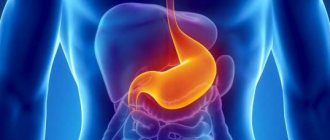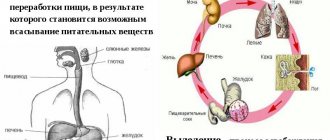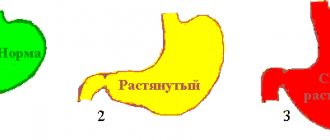Atony is a disturbance in the functioning of the digestive system, accompanied by heaviness, bloating, loss of appetite, and belching. Such symptoms indicate that the stomach is not working - the reasons for the development of pathology in adults and children may be different, but in any case, the problem should be solved immediately.
Atony – disruptions in the functioning of the digestive system
Restoring gastric motility
Gastric arrest can be caused by organic and functional disorders. Peristalsis worsens with peptic ulcers, cancer, gastritis, GERD (gastroesophageal reflux disease), dysphagia, viral infections, acute intestinal pseudo-obstruction, which occurs with myocardial infarction, acute pancreatitis, peritonitis, renal colic.
Also, a disorder can occur due to damage to the branches of the vagus nerve (which happens during surgical interventions), diseases that cause damage to smooth muscle cells (amyloidosis, systemic scleroderma), anorexia nervosa, neurological disorders (damage to the central nervous system, tumors in the brain, increased intracranial pressure, disease Parkinson's), ischemia.
It is possible to determine why a person’s stomach has stopped working only after examination. To get rid of the disease, you will need to undergo complex therapy, which will include diet therapy and drug treatment, and in some cases even surgery (for ulcers, strictures, oncology).
When glucose levels increase, the walls of the capillaries that supply the nervous tissue are damaged, which leads to a disruption in the transmission of nerve impulses and a decrease in the tone of muscle cells. Therefore, it is necessary to check whether type 2 diabetes has developed.
The disorder can appear without visible organic pathologies. In approximately a third of patients who complain that their stomach has become discolored, it is not possible to detect morphological changes. Some experts believe that idiopathic gastroparesis develops due to infection with cytomegalovirus or Epstein-Barr virus.
The most common forms of gastroparesis are primary or idiopathic (36%) and diabetic (29%); the condition develops much less frequently after surgery and as a result of other disorders (13%).
If there are no organic pathologies, then it is necessary to carefully monitor the diet and exclude any foods that reduce gastric motility and cause bloating. Decreased tone and peristalsis is the main reason for gastric arrest. If a stop occurs, then measures must be taken to restore motor skills.
The rate of gastric emptying and contraction of intestinal muscles is affected by alcohol, opiates, and lithium. If motor skills improve only after drinking, then it is necessary to reduce the amount of alcohol consumed and treat poisoning (sorbents, restoration of water-salt balance).
Some patients may require surgery
Motor skills also change if the patient receives certain medications, for example, anticholinergics, clonidine, dopamine agonists, H2-blockers of histamine receptors, proton pump inhibitors, progesterone. If gastric arrest occurs while taking medications, then you must notify your doctor about this so that the doctor changes the treatment regimen or selects an alternative therapy.
If a child’s digestive organ becomes damaged, then the cause of the disorder may be a strong emotional shock (weaning, potty training, adaptation to the garden). Massage and heat will help the child get his stomach moving.
The abdominal area should be warmed by placing a heating pad or a warm diaper for 15–20 minutes. Then the tummy needs to be stroked clockwise for half an hour. In most cases, these measures are enough to get the gastrointestinal tract (gastrointestinal tract) working.
During pregnancy, disruption of the evacuation function may have physiological causes.
Clinical picture of atony
Atony is characterized by intense, aching pain sensations localized in the stomach area, which appear in the very first minutes of the development of the pathology. As a result of the pain syndrome, malaise, nausea and dizziness develop.
If the stomach is stuck, the following symptoms appear: dull or sharp pain in the abdomen, a full stomach from a small amount of food, bloating and flatulence, hiccups, nausea, bad breath, shortness of breath, increased temperature. If you press on your stomach, you will be able to feel that there is no pulsation. Useful articles on the topic - how to raise the prolapse of the stomach and why it prolapses.
What to do if pathology appears
The doctor will tell you what to do to make the stomach work after finding out the cause of the disorder and determining its degree. The treatment tactics for gastroparesis depend on the severity of the patient’s condition and the causes that provoked it.
There are three degrees of gastroparesis:
- Easy. Symptoms of the disease disappear quickly after taking medications, and there is no sudden weight loss. A diet with minimal restrictions helps to avoid relapses.
- Average. Symptoms are only partially relieved by medication. To normalize the functioning of the stomach, lifestyle adjustments and a balanced diet are required.
- Heavy. The clinical picture persists even after specific drug therapy. The patient needs constant medical supervision.
To normalize gastric motility it is recommended:
- diet;
- drug therapy;
- physiotherapy;
- massage.
In extremely severe cases, the patient cannot eat on his own; feeding occurs through a tube.
https://youtu.be/1RMyW77cu5s
Symptoms of the disorder
Symptoms, if the stomach has stopped, appear spontaneously. The patient complains of:
- flatulence;
- periodic pain in the stomach;
- vomiting reflex;
- burping;
- rancid odor from the mouth;
- the content of green mucus in the vomit;
- feeling of fullness in the stomach after eating a small amount of food;
- tachycardia;
- increased blood pressure;
- hearing impairment;
- dizziness;
- causeless and spontaneous weight loss;
- increase in hydrochloric acid in gastric juice.
Some patients experience increased blood pressure
The symptoms are similar to many gastrointestinal pathologies. The most pronounced symptom when the digestive organ stops is bloating and a constant feeling of fullness. The gag reflex brings relief. In the absence of therapeutic measures, a complication in the form of gastritis is possible.
Changing your diet
If the cause is nutritional, then it is necessary to reconsider the diet, give up unhealthy foods, eat foods low in fiber and fat, but with a sufficient content of vitamins, essential amino acids, and unsaturated fatty acids.
It is necessary to exclude foods that cause increased gas formation (carbonated drinks, baked goods, legumes, milk, brown bread). It is also advised to remove strengthening foods from the menu, such as rice, pears, and boiled eggs. It is important to eat small portions, but many times a day. It is advisable that the food be liquid and pureed. Some experts recommend eating one or two tablespoons, but every 1.5–2 hours.
If motor skills are impaired, it is advisable to eat liquid and crushed food
Main causes of the disease
The most common and main cause of gastric dysfunction is dietary errors, especially eating on the go or at night. As well as eating huge quantities of fatty, spicy and fried foods. It’s even worse if it’s accompanied by drinking large amounts of alcohol.
The stomach often becomes stiff as a result of the influence of general processes occurring in the body:
- innervation disorders in diseases of the nervous system;
- overwork, disturbances in sleep and rest patterns;
- fast weight loss;
- smoking;
- exhaustion after severe infectious diseases (pneumonia, dysentery, influenza and others);
- acute pathologies of organs located close to the stomach;
- after surgical interventions on the abdominal organs or general anesthesia.
Spotted! People with weak physical development, underweight, and those exposed to nervous stress and frequent overwork especially suffer from atony.
Folk remedies for restoring gastric motility
You can also use folk remedies at home. To make the organ work, healers recommend:
- Before meals, eat a spoonful of dried and crushed milk thistle herb and wash it down with water;
- drink an infusion of oregano. To prepare, you will need 10 grams of medicinal herbs and a glass of boiling water. The product should sit for half an hour. Take two sips twice a day;
- drink a glass of water with half a teaspoon of soda;
- make a decoction of cinnamon. Pour a teaspoon of cinnamon into a glass of hot water and mix well. Then put on fire for a few minutes. Drink the drink on an empty stomach 30 minutes before meals three times a day, course 3-4 days;
- drink a herbal decoction of buckthorn bark, marshmallow root, and fennel fruit. Mix the ingredients in equal proportions. Pour one tablespoon of the mixture into 300 ml of boiling water and hold in a water bath for 15 minutes, and then leave to infuse for half an hour. Drink a glass after meals.
To normalize peristalsis, physical therapy may be recommended. It is useful to do the exercise “bicycle”, “birch tree”, while lying on your back, clasp your knees and swing from side to side. If motor skills stop frequently, you should consult a doctor.
Why does the digestive organ stop working?
When a person’s stomach stops, a decrease in the tone of his muscle structures is gradually observed. Once food enters the organ, it stops moving normally through the digestive system or stops completely. Gradually, the food lump accumulates in the stomach, which can further weaken the muscles. The person begins to experience discomfort, and the condition quickly worsens. The digestive organ fails under the influence of such negative factors:
- prolapse of the stomach;
- peptic ulcer disease, gastritis, cancer;
- problems of a neurological nature;
- rapid weight loss;
- overwork;
- abuse of bad habits;
- binge eating;
- frequent consumption of spicy, fatty and salty foods;
- acute diseases of organs involved in digestion;
- complication after surgery performed under general anesthesia.
In a child, gastric stoppage is often provoked by psychological factors and stress, for example, the first trip to kindergarten, a tense situation at home, problems at school. Often, signs of digestive organ failure occur during pregnancy. This is caused by hormonal changes in the body, during which the normal functioning of internal organs changes, with the digestive system being one of the first to suffer.
Diagnostics
Taking an anamnesis will help the doctor make a diagnosis.
A gastroenterologist will be able to make an accurate diagnosis, find out what could relax muscle tone and prescribe an adequate treatment regimen. It is with him that you need to make your first appointment. After an initial examination, palpation and history taking, the doctor will give directions for the following diagnostic procedures:
- X-ray of the stomach using a contrast agent;
- fibrogastroscopy;
- Ultrasound;
- CT or MRI.
Be patient and everything will be fine
Restoring normal function of the digestive organ takes time. You must patiently follow all the doctor’s instructions, who will tell you what to treat and how to eat.
In the first week of a therapeutic diet, the following are usually allowed:
- all porridges cooked in water;
- boiled potatoes without oil;
- fruits;
- low-fat cottage cheese;
- Steamed fish.
And the second week can be diversified with boiled lean meat. It will not be superfluous to include light vegetable soups in your diet. Fermented milk products are also good during this period, but not immediately, but for 4-5 days. And if the poisoning was severe, then you can start drinking milk only from the second week.
Important! Food should not be overheated or too cold. It should be warm.
https://youtu.be/cCErGBQYLxI
Prevention
In most cases, such problems can be avoided by maintaining personal hygiene and monitoring expiration dates. Therefore, for prevention it is enough to follow simple rules:
- You should wash your hands thoroughly before eating. And also pay special attention to touching animals - be sure to wash your hands after that.
- Proper cooking requires separate cutting boards for bread and meat, as well as separate knives. After preparing meat or fish, hands should be washed with particular persistence.
- Completely defrost before cooking poultry, meat and fish from the freezer.
- Proper storage: Raw foods should be stored closed and separate from cooked foods.
- Prepared food is heated at a temperature of at least 60 degrees.
- Products are stored at temperatures below + 4 degrees.
- Vegetables and fruits should be well washed, and meat and fish carcasses/dishes should be well cooked.
- The surface of tin cans with food products, for example, condensed milk, canned food, etc., is thoroughly washed with dishwashing detergent before opening.
- Particular attention should be paid to the expiration dates and freshness of products.
- Too low a price in stores and catering establishments should be alarming.
- In hot countries, poisoning occurs more often.
All people, due to the characteristics of their body, react differently to the same viruses and bacteria. Some are more resistant to such troubles, others get sick immediately. But the recovery period for everyone has certain rules and regulations that will help you get out of poisoning with minimal losses to your health and well-being.











